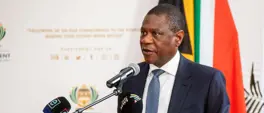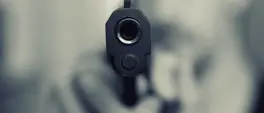'Mnakwethu': Preying on black women's vulnerable moments for entertainment? Mseleku disagrees
Zongile Nhlapo
27 June 2024 | 5:25For 'Mnakwethu' host Musa Mseleku, the show merely reflects reality and is popular because of this, not the emotional reactions of the black women featured on the show.
JOHANNESBURG - When local filmmaker Nondumiso Masache started in television over a decade ago, she worked on shows about edutainment and nation-building.
“I researched and produced content [with shows such as Talk SA and 100% Youth] I resonated with, told stories of South Africans in a respectful way, and it was the kind of work that fed my soul,” she told Eyewitness News.
The award-winning producer recalled the time as being the best of her TV career.
Masache, whose current focus is documentaries, said she started noticing a shift in TV content around 2017, “and it's been downhill from there”.
“Most of these channels will tell you that their focus is on providing entertainment, not necessarily educating.
“And that's how we find ourselves with shows such as Mnakwethu, Isencane Lengane, and Uyajola 9/9."
MNAKWETHU IS 'REAL LIFE'
For Mnakwethu host, Musa Mseleku, however, nothing is going downhill. Instead, these shows are servicing a TV content gap previously uncatered for.
“These shows appeal so much to both women and men for different reasons,” the KwaZulu-Natal polygamist told Eyewitness News.
"What you see on Mnakwethu is exactly how society is,” reasoned Mseleku - who is also the star of his own popular polygamy show, Uthando Nes'thembu.
He has four wives, and a pending fifth one, and believes one of the reasons these shows continue to rank among the most watched season after season is because they reflect real life in a way that’s never been done before on South African television.
“Men do have more than one woman in their lives. When it appears on Mnakwethu, it becomes an issue because it’s on TV, but other than that it reflects the reality."
QUALITY AND ACCURACY OF REPRESENTATION
It’s the reflection of this reality that presents a problem for Wendy Qampi, who in this Master’s paper argues that the quality and accuracy of the representation of black South Africans on television is questionable.
“It can be argued that black pain and vulnerabilities have been used to be part of the capitalist mode of media production,” writes Qampi, whose research focused on representation and audience reception of black families as portrayed on SA reality TV.
Qampi posits that Mnakwethu – which formed part of the shows analysed in the research - "utilises the wives’ raw emotions, who will get viewers hooked into watching such eruptive reactions every week.”
One such eruptive reaction featured on the first-ever promo of Mnakwethu four years ago. “U-feelani emshadweni wami u-feelani?” (what are you feeling, in my marriage?) - asked a visibly irate Sithokozile Mchunu.
“Number one, what irritated me was him [Qondanisa, the husband] bringing cameras and strangers,” Mchunu told the Honest Hour Podcast ZA, adding she’s not against polygamy, but rather the disrespectful way it was done on the show.
In season 3, Mseleku had to physically come between two women when the first wife charged angrily at the other woman. And there have been other instances where tension escalated to the point of production intervening.
Coincidentally perhaps, these eruptions make it to the show's promos and are some of Mnakwethu's most-watched clips on YouTube.
Mseleku, however, did not comment when asked about the shock-as-entertainment factor aspect of the show.
SURPRISE ELEMENT PRIVATELY OR PUBLICLY
Umsamo Institute's Siyabonga Mkhize admits there is a surprise element to the Mnakwethu interaction, but believes it would still be there, whether the request was carried out privately or publicly.
“Fine, you get the shock factor, but you also get to have the conversation [around polygamy]”.
Notably, the surprise and shock element is also in the intimate details the men get to share with the viewers before the first wives get to weigh in - such as their infertility challenges, intimacy problems, or the state of their finances - that the nation would otherwise not be privy to.
Mkhize, who also dabbles as a reality television host says we must remember that these are consenting adults, and that consent can be revoked at any time during the filming process.
“You can get up and walk away”, he told Eyewitness News.
Evidently, however, those instances have been few and far between.
Instead, in a rare occurrence of a wife walking out while dishing out expletives in a previous season, the situation later escalated into physical violence between the featured couple, prompting intervention by the production team.
POLYGAMY IN THE ABSENCE OF CAMERAS
Mkhize said a show like Mnakwethu should be given some logistical grace. He added that the window of production does not afford the space to approach the polygamy matter in the manner it is generally done, at least in the Zulu culture.
The cultural expert explained to Eyewitness News that ideally, in the absence of cameras, a polygamy discussion should take place in the presence of elders from both families.
“It's almost like the man and his family should motivate why they’re asking for polygamy.”
The Ngithande Nami host stressed that polygamy is not something dictated to the wife, but rather discussed.
“The narrative that she’s dictated to, that polygamy is shoved down the throat, [no], she has every right to express how she feels about it" - useful advice for some men on the show, including polygamist Qinisela Xaba, who appeared in season 3.
After making his request and being met with some resistance from his wife, towards the end he firmly said: “I think I should mention that I have the last say as the man."
CONTENT BALANCE POSSIBLE?
Masache, who by her own admission indulges in shows such as Mnakwethu from time to time, believes while trends and profitability are real and crucial considerations, “TV is a numbers game after all”, TV content can be culturally sensitive and respectful, so it doesn't appear to be playing on the vulnerabilities, pain, and humiliation of black people for entertainment or profit purposes.
"Entertainment can coexist harmoniously with cultural authenticity and social responsibility”.
Moreover, she believes South Africa is in dire need of a more balanced TV offering that services the diverse interests of the South African population.
“I think broadcasters need to be intentional about striking a balance between entertainment and educational shows."
It is this collaborative approach, the filmmaker maintains, that would foster a healthier and socially responsible media landscape.
Get the whole picture 💡
Take a look at the topic timeline for all related articles.
















